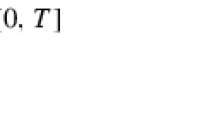Abstract
The existence of three solutions for a partial differential inclusion involving a perturbed nonlinearity and two real parameters is proved. Moreover, an estimate of the norms of solutions, independent of both the parameters and the perturbation, is achieved. The main theoretical tool is an extension to nonsmooth functionals of a very recent three critical points theorem of Ricceri.
Similar content being viewed by others
References
Anello, G.: A multiplicity theorem for critical points of functionals on reflexive Banach spaces. Arch. Math. (Basel) 82, 172–179 (2004)
Chang, K.C.: Variational methods for nondifferentiable functionals and their applications to partial differential equations. J. Math. Anal. Appl. 80, 102–129 (1981)
Clarke, F.H.: Optimization and Nonsmooth Analysis. Wiley, New York (1983)
Degiovanni, M., Marzocchi, M.: A critical point theory for nonsmooth functionals. Ann. Math. Pures Appl. 167, 73–100 (1994)
Faraci, F., Iannizzotto, A.: An extension of a multiplicity theorem by Ricceri with an application to a class of quasilinear equations. Stud. Math. 172, 275–287 (2006)
Frigon, M.: On a critical point theory for multivalued functionals and application to partial differential inclusions. Nonlinear Anal. 31, 735–753 (1998)
Gasiński, L., Papageorgiou, N.S.: Nonlinear Analysis. Chapman & Hall/CRC, Boca Raton (2006)
Iannizzotto, A.: Three critical points for perturbed nonsmooth functionals and applications. Nonlinear Anal. 72, 1319–1338 (2010)
Ribarska, N., Tsachev, T., Krastanov, M.: A note on: “On a critical point theory for multivalued functionals and application to partial differential inclusions”. Nonlinear Anal. 43, 153–158 (2001)
Kristály, A., Marzantowicz, W., Varga, Cs.: A non–smooth three critical points theorem with applications in differential inclusions. J. Glob. Optim. 46, 49–62 (2010)
Motreanu, D., Panagiotopoulos, P.D.: Minimax Theorems and Qualitative Properties of the Solutions of Hemivariational Inequalities. Kluwer, Dordrecht (1999)
Naselli, O.: A class of functionals on a Banach space for which strong and weak local minima do coincide. Optimization 50, 407–411 (2001)
Ricceri, B.: Sublevel sets and global minima of coercive functionals and local minima of their perturbations. J. Nonlinear Convex Anal. 5, 157–168 (2004)
Ricceri, B.: A further three critical points theorem. Nonlinear Anal. 71, 4151–4157 (2009)
Author information
Authors and Affiliations
Corresponding author
Additional information
To my father, in occasion of his eightieth birthday.
Rights and permissions
About this article
Cite this article
Iannizzotto, A. Three Solutions for a Partial Differential Inclusion Via Nonsmooth Critical Point Theory. Set-Valued Anal 19, 311–327 (2011). https://doi.org/10.1007/s11228-010-0145-9
Received:
Accepted:
Published:
Issue Date:
DOI: https://doi.org/10.1007/s11228-010-0145-9



